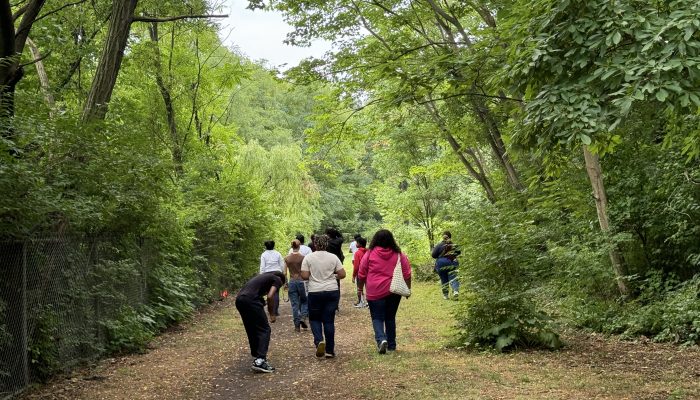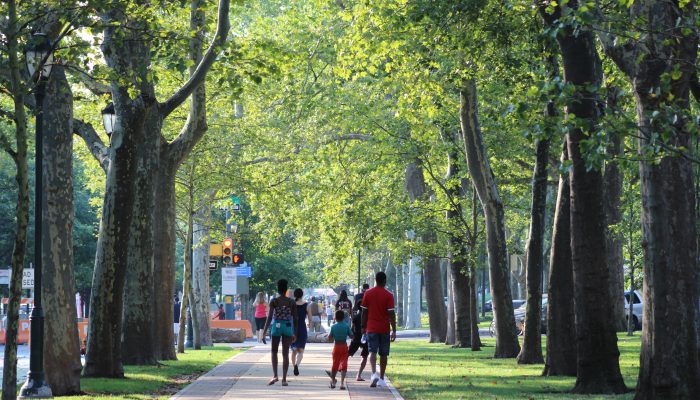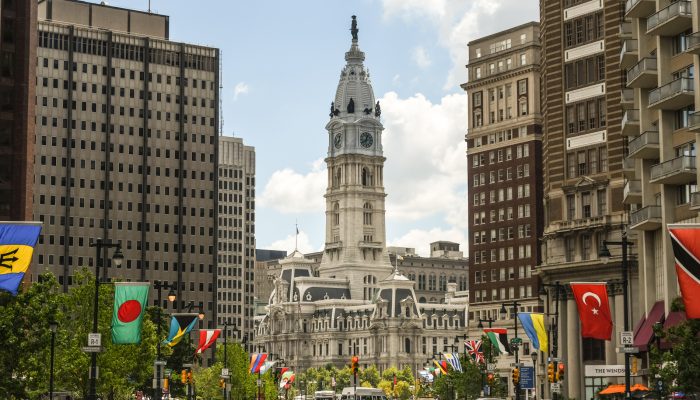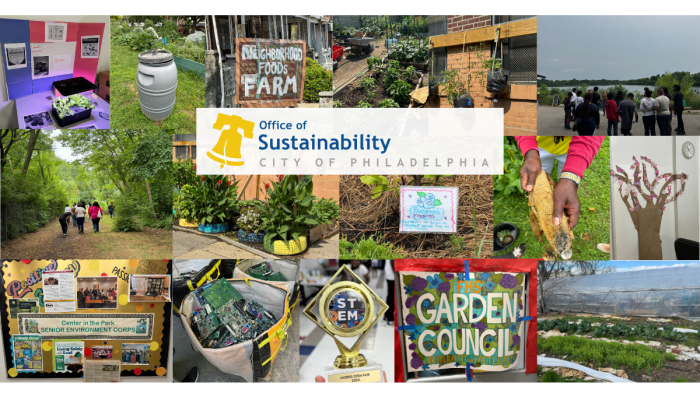In 2014, the Environmental Protection Agency (EPA) declared February to be Environmental Justice Month to commemorate the signing of historic 1994 executive order 12898: “Federal Actions to Address Environmental Justice in Minority Populations.” This year, to commemorate, we’re highlighting updates on environmental justice initiatives in Philadelphia and resources available to residents for addressing environmental issues in their homes and communities.
About the environmental justice movement
Environmental justice is a grassroots movement that first started gaining momentum in the 1980s led by Black, Indigenous, and People of Color (BIPOC) communities advocating for economic and racial justice, community self-determination, and environmental stewardship in decision-making. According to the EPA, environmental justice is the fair treatment and meaningful involvement of all people regardless of race, color, national origin, or income with respect to the development, implementation, and enforcement of environmental laws, regulations, and policies. This goal will be achieved when everyone enjoys the same degree of protection from environmental and health hazards and equal access to the decision-making process to have a healthy environment in which to live, learn, and work.
In Philadelphia, the longstanding challenges of systemic racism have led to differences between neighborhoods. Black, Brown, and low-income neighborhoods are most likely to be near industrial areas and experience high rates of pollution. Those same areas are less likely to have green spaces like parks and gardens. These differences contribute to inequality in health and wellbeing.
The environmental and sustainability movements owe a great deal to frontline communities—those who live or work on the frontlines of exposure to environmental harm—who organize and continue to advocate for their right to clean land, air, and water for all. Individuals and communities throughout Philadelphia work every day toward environmental justice, whether by growing food, checking in on neighbors during heat waves, or organizing around air quality, zoning, development, or a green economy.
How we define environmental justice
The Office of Sustainability defines environmental justice as the:
- equitable distribution of environmental benefits and burdens;
- righting of past harmful environmental policies and practices; and
- meaningful involvement in decision-making, particularly for those most impacted and that have been historically marginalized.
We envision an environmentally just city where race, socioeconomic status, and ZIP code no longer predict residents’ health or exposure to hazards.
Philadelphia Environmental Justice Advisory Commission
Launched in 2022, the Philadelphia Environmental Justice Advisory Commission (PEJAC) is led by Philadelphia residents with lived experiences in environmental justice issues and who are working to ensure that all residents have a livable community, free of environmental toxins and hazards. PEJAC serves as the steering committee to determine eligibility criteria and recommend grantees for the annual Community Resilience and Environmental Justice (CREJ) Fund, which directly resources local frontline and fenceline communities to advance their vision of environmental justice. Through the CREJ Fund, the City has supported more than 30 community-based projects addressing greening, food access, air quality, and community resilience in neighborhoods across Philadelphia. Learn more about the 2023 grantees and 2025 grantees and their impactful projects.
Resources for residents
Explore the resources below to learn how to address environmental issues in your home and community.
Air Quality
- Keep track of Philadelphia’s daily air quality and protect your health during these events. Monitoring and resources are available on the City’s air quality webpage.
- Receive an email when an Air Quality Action Day is declared by signing up to receive air quality notifications.
- Alert Air Management Services to issues such as idling, dust, or unusual odor. Call 215-685-7580 (business hours) or 215-686-4516 (all other times).
Healthy Homes
- Visit the Lead and Healthy Homes Program webpage to find what resources are available to ensure a home that is free from lead and other hazards.
- Use the City’s Housing Benefits Tool to find out which City housing programs you may be eligible for. These include:
- The Philadelphia Energy Authority’s Built to Last Program, a “one stop shop” whole home repair program providing critical home repairs, health and safety improvements, and energy efficiency and clean energy improvements.
- Philadelphia Housing Development Corporation’s (PHDC) Adaptive Modifications Program, which helps low-income individuals with permanent physical disabilities live more independently in their homes. It provides free adaptations to a house or an apartment, allowing easier access to and mobility within the home.
- PHDC’s Basic Systems Repair Program, which provides free repairs to correct electrical, plumbing, heating, limited structural and carpentry, and roofing emergencies in eligible owner-occupied homes in Philadelphia.
Water Quality
- For any questions about lead in your water, call the Philadelphia Water Department hotline at 215-685-6300. Staff will provide information on water testing, safety tips, and replacement options.
- Search your property’s address on the Philadelphia Water Department’s Water Line Material Map to see what material your water service line is made of.
- Make sure your plumbing and lateral, which connects your house to the water main, are in good, safe condition to ensure drinking water quality. The Homeowner’s Emergency Loan Program (HELP) can help homeowners afford repairs to water and sewer service pipes.
Flooding and Storms
- Sign up for ReadyPhiladelphia, the region’s emergency text and email alert system. The alerts are free, but standard text messaging rates may apply.
- Take part in the Philadelphia Water Department’s Basement Protection Program to protect your basement from flooding.
- Learn more about residential stormwater tools and what you can do to beautify your home and help our streams on the Philadelphia Water Department’s Raincheck Program website.
- Visit the City’s flood preparedness webpage for more information on available resources.
- Use the Resilient Community Worksheet to plan for how to respond to a storm or other emergency event.
Extreme Temperatures
- For extreme heat days, find your local cooling center with the City’s cooling center map resource.
- Find ways to prepare your community for hotter summers with the Community Heat Relief Toolkit.
- The Low Income Home Energy Assistance Program (LIHEAP) can help you pay your home heating bill, whether you own or rent your home. Call 215-560-1583 to get an application.
- Call PECO CARES at 1-800-774-7040 to find out if you qualify for assistance with your electricity bill.
- For help paying energy bills, visit a Neighborhood Energy Center. Find a list of centers on the City’s Housing & Community Development webpage.
Waste, Litter, and Illegal Dumping
- Report illegal dumping and unlicensed construction to Philly311 by calling 3-1-1 or visiting phila.gov/311.
- Learn about the City’s Vacant Lot Program on the City’s Vacant Lot Program webpage.
- Help keep your neighborhood clean by organizing and electing a block captain. Learn more on the Philadelphia More Beautiful Committee webpage.
- Use the City’s Sanitation Convenience Centers to drop off items such as tires, appliances, e-waste, mattresses, or yard waste. Visit the Streets Department’s website for more information.
- Schedule a trash pickup appointment for bulky household items like large appliances and furniture through the Bulk Collection Program.
Green Space
- Read How to Garden Safely in Philadelphia to learn how to grow safely in Philadelphia’s urban soil.
- Visit TreePhilly.org to request a free yard or street tree and learn about the City’s first ever urban forest strategic planning process.
Zoning and Development
- Connect with your Registered Community Organization (RCO) to stay informed of proposed developments in your neighborhood.
- Attend a Zoning Board of Adjustment hearing to comment on any appeals decisions.
- Participate in the Citizens Planning Institute to learn more about land use decision-making.




